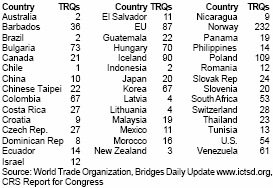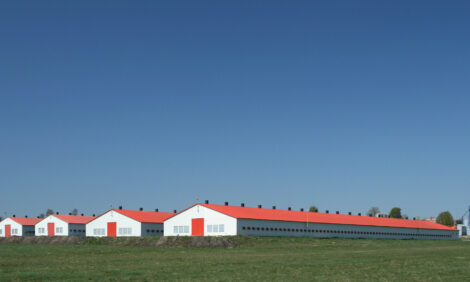



International Egg and Poultry Review
By the USDA's Agricultural Marketing Service - This is a weekly report looking at international developments concerning the poultry industry, this week looking at the sixth WTO Ministerial Conference.
World Trade Organization: The Hong Kong Ministerial
The sixth WTO Ministerial Conference was held in Hong Kong, China,
December 13-18, 2005. After six days of negotiation, ministers from
the WTO’s 149 Member governments reached a deal to put the Doha
Round trade talks “back on track.” The Hong Kong Ministerial
Conference did establish 2013 as the end-date for eliminating
agricultural export subsidies, contingent “upon the completion of the
modalities.”
The disciplines on export credits, export credit guarantees or insurance
programs, exporting state trading enterprises and food aid will be
completed by April 30, 2006 as part of the modalities.
Domestic farm subsidies are to be classified in three bands for the
purposes of reductions in the Final Bound Total AMS (Aggregate
Measure of Support). The Member with the highest level of permitted
subsidy (the EU) will be in the top band. The Members with the second
and third highest levels of support (the US and Japan) will be in the
middle band and all other Members would fall in the bottom band.
The final Declaration allows developing countries to self-designate an
appropriate number of tariff lines as Special Products (SPs) guided by
indicators based on the criteria of food security, livelihood security and
rural development. They would also have recourse to a Special
Safeguard Mechanism (SSM) to protect farmers from a surge in imports
or a collapse in import prices.
Members had been prepared to make concrete, but conditional,
proposals on the number of sensitive products. But proposals ranged
from as little as 1% to as much as 15% of tariff lines. It was also
proposed (but not discussed with Members as a whole) that a
developing country Member should have the right to designate at least
20% of its agricultural tariff lines as Special Products.
In 2004, 43 WTO members had a combined total of 1,425 tariff quotas
in their commitments.

Source: Department of Commerce, U.S. Census Bureau, Foreign Trade Statistics
Saudi Arabia
Saudi Arabia’s poultry meat production (mainly broiler meat) is forecast
to reach 490,000 metric tons (MT) in 2006, an increase of two percent
compared to the expected 2005 level of 480,000 metric tons. According
to the Ministry of Agriculture (MOA) and poultry farmers, the expected
increase is based on the continued expansion of existing producers,
and the expected operation of newly licensed poultry farms. Poultry
meat imports for 2006 are expected to reach about 440,000 MT, a two
percent increase compared to the current year.
According to local importers, Brazilian frozen broiler meat exports this
year are expected to increase by at least 10 percent compared to the
2004 export level of 333,223 MT. The Kingdom's ban on Chinese poultry
and the strength of the Euro compared to the U.S. dollar are two factors.
France, the second largest broiler meat exporter to the Kingdom, is
expected to lose significant market share to Brazil this year compared
to last year. In 2004, France exported 82,981 metric tons of frozen broiler
meat to the Kingdom.
The C&F prices of Brazilian frozen poultry meat exports to the Kingdom
have begun to decrease from high of $1,490 per MT in November 2005
(highest price ever reported) to $1,450 MT in December 2005, a
decrease of about 3 percent. A further $30 to $50 decease in Brazilian
broiler meat prices is expected in January/February 2006 due to higher
stocks of frozen meat available in the Saudi market, contributing to a
lower demand and increased offers by Brazilian exporters to supply at
more competitive rates. Major Saudi broiler meat importers claim that
Brazilian exporters are currently holding higher than normal stocks,
which they want to reduce, due to some difficulties they are facing in
exporting to Iraq and Iran.
Source: USDA/FAS
To view the full report, including tables please click here
Source: USDA's Agricultural Marketing Service - 10th January 2006








